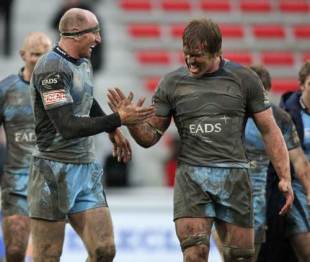|
Comment
Wales cannot rest on its laurels
Huw Richards
December 15, 2008

Wales' Gareth Thomas and Andy Powell celebrate the Blues' latest Heineken Cup triumph that will have pleased national coach Warren Gatland
© Getty Images
Enlarge
OK, come on, own up. What did you think when you heard that the Welsh Rugby Union was the International Rugby Board's union of the year? If you answered 'mild reflexive hilarity plus disbelief that such a prize even exists' you weren't very far from my reaction. But if you think about it for a moment, it wasn't quite such a shock. There have admittedly been years - far too many of them, and a lot of them recent - when the WRU might have struggled to see off a short-list otherwise comprising the Zimbabwe Cricket Union, Newcastle United and the board of Lehman Brothers. But if the award reflects the progress of national teams in 2008 and chooses to give credit to that country's governing body, however much credit it truly deserves, then you can see how the IRB's judging panel arrived at their verdict. Just consider how it felt to be a Welsh rugby fan a little over a year ago. The most recent significant events were the eclipse of Nantes and the truly shocking handling of Gareth Jenkins' departure, while the WRU's main idea for lightening the mood appeared to be naming a trophy after Prince William. You can certainly argue that the WRU has essentially got one thing right since - choosing the right coach - and that this hardly outweighs the abysmal failings as an employer shown in its dealings with Jenkins and, before him, Mike Ruddock. But having hammered them for those fiascos, it is only fair to give them credit when they do get a big decision right. And as we go into the phase that has defeated Welsh rugby in its few moments of tangible success over the last 25 years - ensuring that initial progress is maintained rather than rapidly dissipated - there are reasons to be guardedly optimistic. There is serious evidence of progress in the sober response to the autumn internationals. Beating Australia, scaring South Africa and giving the All Blacks the toughest game of their four isn't by any means a bad November. There have been recent years in which it would have been cause for national rejoicing. It is thoroughly welcome, though, that Warren Gatland clearly thinks that creditable defeats are not good enough and that Wales needs to set sights on beating the southern trio. It won't be easy. It may not necessarily be achievable. But without aiming higher, the near-certainty is that the standards set in the spring of 2008 will not be sustained. It undoubtedly helps that, unlike his predecessors, Gatland is clearly in charge. He has a united set of coaches he himself chose. Any senior player who chooses to challenge his authority will find himself on a loser. If injuries and a certain amount of ring-rustiness meant that, against tough opponents far more practised in the experimental law variations, Wales could not quite recapture the panache seen in winning the Grand Slam, nor was there the huge falling-off we might have feared. Lee Byrne and Shane Williams are still in sublime form, Leigh Halfpenny and Andy Powell looked like real discoveries and if the pack won't terrify anyone, at least that freedom from fear is increasingly - the odd line-out glitch apart - extended to their supporters. Further down the food chain, all hail the Heineken performances of Cardiff Blues. It has been a long time coming, but it finally looks as though they're punching something like their historic weight. Credit too to the Blues management for keeping faith in their long-term investment in the coaching abilities of Dai Young rather than dumping at any of several points over the last few seasons when it seemed doubtful whether it would ever come off. So maybe the French clubs - and Biarritz more than most - do look collectively off the pace, but previous Blues teams would have come unstuck at the Aguilera even under those circumstances. So why, then, is good cheer only as yet qualified? There's an awareness that so often in recent years what looked like light at the end of the tunnel turned out to be flames, that apparent promise has so often evaporated at club, regional and national level. It still doesn't take much to turn success into failure (ask Stade Francais after their defeat at Harlequins on Saturday). Wales's limited resource base means it has to run much faster than England or France simply to be sure of keeping up. This picture looks considerably less cheerful if your emotional capital is tied up in the Scarlets. But, thanks not a little to Gatland, there's the thought that the current upswing might be sustainable - that this time next year might find us still feeling as good about Welsh rugby's present and immediate future as we do at the moment. If good cheer, however guarded, still reigns in mid-December 2009 that really will be worth an award. © Scrum.com
|
Live Sports
Communication error please reload the page.
-
Football
-
Cricket
-
Rugby
-
- Days
- Hrs
- Mins
- Secs
F1 - Abu Dhabi GP
Abu Dhabi Grand Prix December 11-131. Max Verstappen ()
2. Valtteri Bottas (Mercedes)
3. Lewis Hamilton (Mercedes)
4. Alexander Albon ()
5. Lando Norris ()
6. Carlos Sainz Jr ()
-
ESPNOtherLive >>
Darts - Premier League
Golf - Houston Open
Snooker - China Open
Tennis - Miami Open

